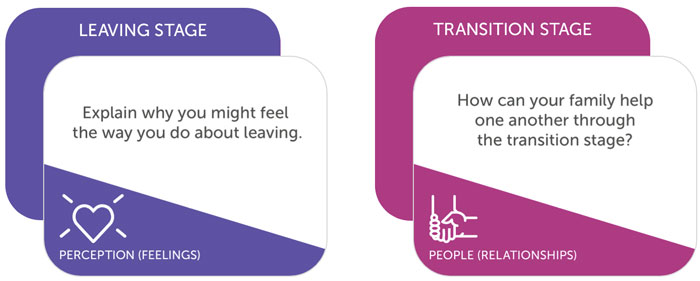Relocation is Emotionally Stressful
Sarah’s experience of relocation includes moving to Singapore, teaching at an international school, and researching and writing her doctorate about Third Culture Kids. In each of these circumstances, whether she relocated, or worked to support others who were relocating themselves, she found the the emotional stress of relocation to be huge.
When we are emotionally stressed, our brain does not function at an optimal level. We tend to become forgetful or experience higher levels of uncomfortable emotions like anxiety or anger, compared to less stressful times. Sarah created ‘A New Adventure: Coaching Cards for an International Move’ for exactly this reason.
Mike W., Regional Manager, Global Software Company “The cards gave us a great structure to work through things in a systematic way. They contained questions we hadn’t thought of before.”
Introducing ‘A New Adventure: Coaching Cards for an International Move’
‘A New Adventure: Coaching Cards‘ cards give a range of conversation starters to use with your family, particularly your children, which support you throughout the emotional stress of relocation.
As a parent, using the cards lightens your ‘cognitive load’ because they provide a clear framework for processing challenging thoughts, feelings and actions at every stage of an international move. It’s one less thing to think about at an extremely busy time. Every move is stressful so even experienced expats, who have moved frequently, find that they benefit from the cards.
Naomi Hattaway, the brains behind the online expat community I Am A Triangle, shared her positive experience of using ‘A New Adventure: Coaching Cards’ with her children before their relocation. You can watch her conversation with Sarah here.
The Relocation Process
Relocation is a process. The relocation process begins as soon as you know you’re leaving and it doesn’t end when you have unpacked your boxes. It can take many months to feel at home in your new location. In fact, the relocation process only comes to an end when you feel settled in your new location.
In order to reflect this process, the conversation starters in ‘A New Adventure: Coaching Cards’ are categorised into one of David Pollock’s stages of transition. As such, there are a set of questions for each stage of your relocation, starting from the moment you know you are leaving to when you feel more at home in your new location.
Dr Sarah Whyte’s 5 Elements of Transition
Within each stage of transition, there are questions for each of the 5 Elements of Transition. The 5 Elements are a robust, research-based model based on Sarah’s doctoral research, her teaching experience in an international school and the existing research literature, including positive and coaching psychology. The 5 Elements ensure consistent focus on specific areas to alleviate the emotional stresses and personal or social difficulties which can have a negative long-term impact for children.
Try out some questions
Here are some example cards from the deck of ‘A New Adventure: Coaching Cards’. The purple cards give conversation starters from the leaving stage, which begins as soon as you know you are going to move on. The transition stage cards are dark pink and designed to be used when you’ve just arrived somewhere new.
Three Top Tips for Discussing Relocation
It’s a great idea to frequently hold short conversations about relocation, both before and after your move. Here are some handy hints to help with that process:
- Choose one card from ‘A New Adventure: Coaching Cards’ a day so answering the questions is a quick and easy task. Relocating countries is an overwhelming experience so the last thing you need is another stressful, onerous job to add to the long list of things to do.
- Let your child lead the conversation; they will naturally time-limit the conversation according to their interest and attention. If they want to revisit the question they’ll often bring it up at another time.
- Think about how best your child might answer questions about the move. Younger children often find it easier to draw their response then talk through the drawing as a way to articulate their ideas. Many parents of teenagers find that their children share much more during conversations in the car compared to a face to face conversation.
If you’d like to buy your own set of cards, please follow this link to Sarah’s website.
Sponsored article from Sarah Whyte
- Email info@sarahwhyte.com.sg
- Website www.sarahwhyte.com.sg
- LinkedIn: linkedin.com/in/sarahwhyteconsulting/
- Facebook: www.facebook.com/sarahwhyteconsulting
- Twitter: https://twitter.com/sarahinsg






We sold everything and moved overseas when my husband retired. But our two youngest were just starting middle school and high school. Since they don’t speak the language here they are both doing online school. Unfortunately the town we moved to is a retirement community. The local kids are all in school related activities. It has been over a year and they still have not met any boys their age! They are not into sports or church groups. I am at a total loss, and feel like I have let them down. Thank God they have each other, but that’s just not enough.
Oh dear, that is tough for them. Can you concentrate on getting their language skills up to speed so they can join the school? It’s such an important social aspect for children. And it seems from your short comment, that this may be the only option.